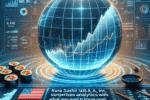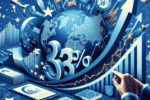Washington, D.C. – As the year 2025 approaches, the global economic outlook is being significantly influenced by the interplay of tariffs and geopolitics.
The ongoing trade wars between major economic powers such as the United States and China are reshaping global supply chains and impacting various industries. Tariffs imposed on imports and exports are causing disruptions in the flow of goods and services, leading to uncertainties in international markets. The fluctuation in trade policies is triggering volatility in the global economy, affecting businesses and consumers alike.
Furthermore, geopolitical tensions between nations are adding another layer of complexity to the 2025 economic landscape. Issues such as territorial disputes, political unrest, and geopolitical rivalries are contributing to economic uncertainty and market instability. The looming threats of conflicts and sanctions are creating challenges for businesses operating in international markets, hampering investment and growth opportunities.
In this tumultuous environment, businesses are forced to navigate through a complex web of tariffs and geopolitical risks to stay competitive and profitable. Companies are reassessing their supply chain strategies, diversifying their sourcing locations, and exploring new markets to mitigate the impact of tariffs and geopolitical uncertainties.
Moreover, policymakers and economists are closely monitoring the evolving situation to devise strategies that can foster economic growth and stability in the face of these challenges. Collaborative efforts are being made to promote dialogue and negotiation between nations, aiming to reduce trade barriers and mitigate geopolitical tensions for the benefit of the global economy.
As 2025 unfolds, the interplay of tariffs and geopolitics will continue to shape the global economic landscape, presenting both opportunities and challenges for businesses and policymakers worldwide. It is imperative for stakeholders to remain vigilant, adaptable, and cooperative in order to navigate through these turbulent times and foster sustainable economic development.










